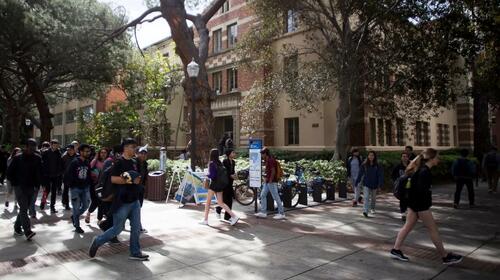UCLA Pulls Ad For ‘Unpaid’ Professor Job Amid Backlash
Universities (and the students and faculty who populate them) like to hold themselves out as paragons of virtue. But despite the immense financial resources of elite American universities, the overwhelming majority of the instructors who teach their classes are poorly paid, and enjoy little – if any – job security, something that has become a ‘fact of life’ for academics.
But UCLA recently tried to push things to the limit, eliciting a furious backlash from academics, who felt the university was trying to exploit its workforce by attempting to hire an adjunct professor with an offer of “zero compensation”.
Unpaid internships for college students are one thing, but the job posting asked for a lot: the candidate needed to have a PhD and a strong teaching record. As the backlash worsened, the university withdrew the job posting – but not before the NYT picked up on it.
The job posting for an assistant adjunct professor at the University of California, Los Angeles, set high expectations for candidates: A Ph.D. in chemistry or biochemistry, a strong teaching record at the college level, and three to five letters of recommendation.
But there was a catch: The job would be on a “without salary basis,” as the posting phrased it. Just to be clear, it hammered home the point: “Applicants must understand there will be no compensation for this position.”
The posting last month caused an immediate uproar among academics across the country, who accused the university of exploiting already undervalued adjunct professors, and suggested this would never happen in other occupations. Under pressure, U.C.L.A. apologized and withdrew the posting.
But the unspoken secret had been fleetingly exposed: Free labor is a fact of academic life.
Unpaid, or poorly paid, positions are the biggest drivers of the ‘inequality’ that American colleges purport to oppose (even though they contribute to the phenomenon, due to a combination of academic selectivity and increasingly unaffordable tuition). As it turns out, the academics union at the University of California system has been fighting these arrangements for years.
What’s even more unfair than the low – or no – pay is that the instructors typically spend long hours reading dense academic papers and answering student questions.
The union representing contingent faculty at the University of California has been fighting the uncompensated positions for years, said Mia McIver, the president of the union, which represents about 7,000 members. “The fact that it is common does not excuse it,” she said.
The union suspects that the number of uncompensated teachers at the university is increasing, said Dr. McIver, who is also a lecturer in the U.C.L.A writing program. “As of March 2019, we had identified 26 faculty members at U.C.L.A. alone,” she said.
In the California system, the trend seemed to have begun with the financial crisis of 2008, Dr. McIver said. By 2010, she said, “We became aware of people who had been laid off and who were teaching for free in the hopes, without any commitment from the university, that if the work came back they would be hired back to teach for pay.”
Many instructors who find themselves suckered into these work-for-free arrangements apparently regret it later. One woman who taught biology class at Washington University for free told the NYT that she later regretted agreeing to do so – especially after she found that instructors in other departments were paying paid.
Liza Loza, a graduate student in molecular microbiology and microbial pathogenesis at Washington University, was excited to be asked to teach a discussion section about four years ago. She had to do a lot of preparation, spending hours reading very dense scientific papers and anticipating students’ questions.
But she saw the job as her chance to make those discussions more hospitable to women and other students who had been shut out of the hard sciences. She remembered her own experience having professors who were so intimidating that she was afraid to speak, and she wanted to set a counterexample.
She was told that the job was unpaid because it was a professional development opportunity. She says the experience was valuable. “I did get a lot out of it on my C.V., but also personally, as something that I wanted to help make better about the program,” she said.
Then last semester, in her third year of teaching the section, she found out by accident that graduate students in other departments were being paid $1,000 for the same work.
“That was for me a bright line,” she said. “It just seemed sort of straightforwardly unfair once I figured that out.”
Elite Universities have fought to keep the system in place, while at the same time seeking to distract from it by promoting their efforts to ’empower’ women and members of the LGBTQ community.
But like the old saying goes, “you can’t eat prestige”. As surging inflation makes it increasingly difficult for anybody to work for free (including white men and women who are members of the upper- and upper-middle-class), will we see a rebellion of the instructors and “contingent” faculty who keep these universities ticking?
Tyler Durden
Fri, 04/08/2022 – 19:20

